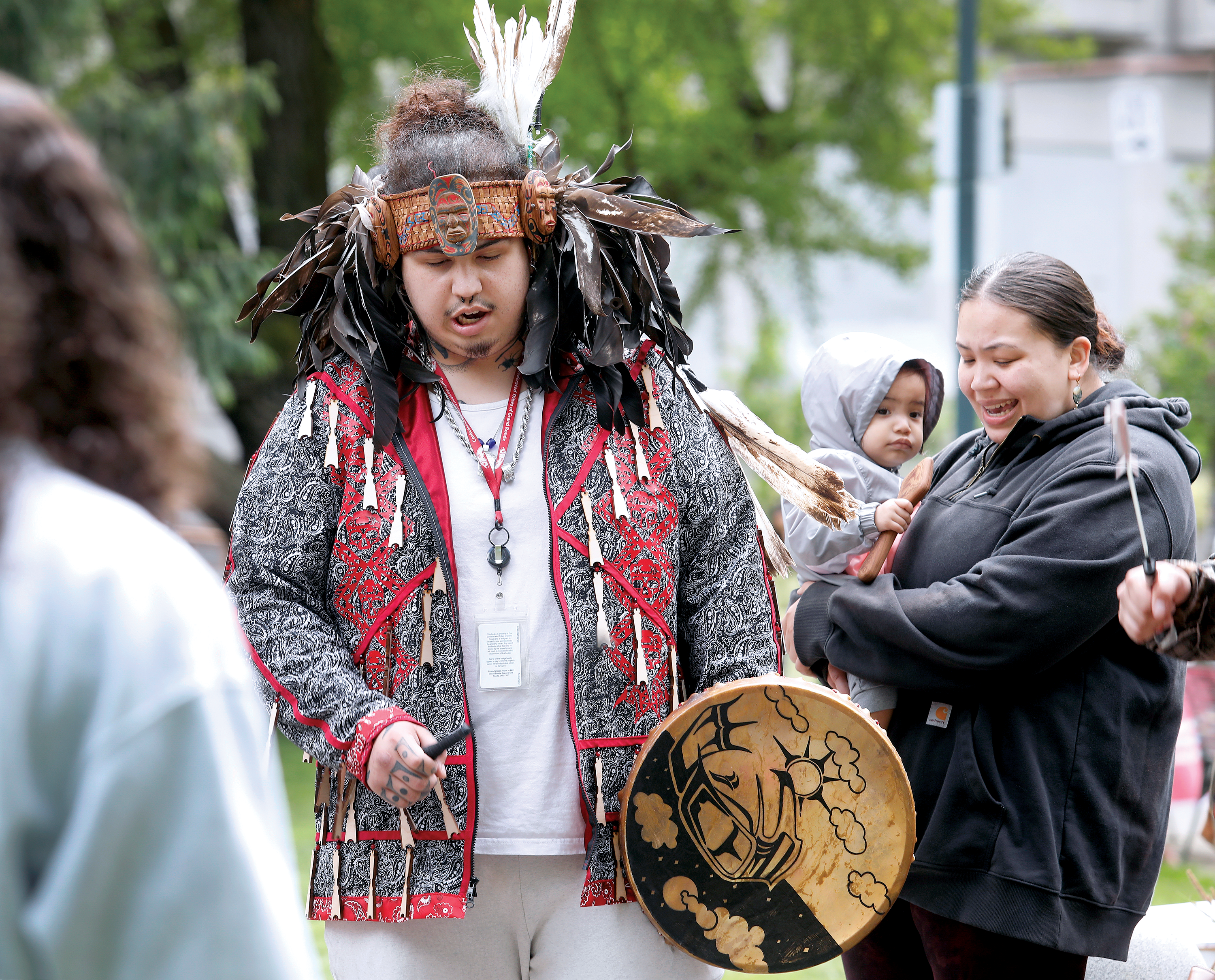Tribal Government & News
Trial over Willamette Falls focuses on questions of ownership, harassment

By Nicole Montesano
Smoke Signals staff writer
PORTLAND -- Officials for Portland General Electric testified in federal court that the utility must own Willamette Falls to ensure public safety and its own operations.
In a trial that began Monday, April 21, at the Mark O. Hatfield United States Courthouse, PGE sought to condemn and take ownership of the falls, where the Tribe has a removable seasonal fishing platform it uses for an annual ceremonial catch of up to 15 hatchery spring Chinook.
PGE officials argued that being in or around the falls without PGE’s authorization is hazardous and must be carefully coordinated.
The Tribe is contesting the condemnation, arguing that PGE is trying to take over the falls, not because of legitimate operational concerns, but to appease other Tribes.
Closing arguments in the trial are scheduled for Tuesday, May 6, after testimony ran a day over the scheduled time.
Attorneys for the Tribe took the lead in defending the lawsuit, while an attorney for the state of Oregon played a minimal role. An attorney for the Confederated Tribes of the Siletz also sat in, asking questions on occasion as a friend of the court, siding with PGE. All four parties will be allowed to present closing arguments.
Grand Ronde Tribal Attorney Rob Greene testified that in a meeting in July 2018, PGE CEO Maria Pope abruptly halted discussions about installing a fishing platform. He said Pope told him, Tribal Council Chairwoman Cheryle A. Kennedy and other staff that the platform was causing friction with the Confederated Tribes of the Warm Springs and the Confederated Tribes of the Umatilla.
“She said PGE couldn't do business that way,” Greene said.
Pope was scheduled to testify in rebuttal Friday, April 25, after Smoke Signal’s press deadline.
PGE officials said they intend to establish a permanent cultural easement for all Tribes, but that negotiations with Grand Ronde had failed. Grand Ronde staff testified that PGE included conditions that essentially guaranteed the Tribe would be unable to establish a fishing platform.
PGE officials testified extensively that they have significant safety concerns about the fishing platform.
“PGE is obligated to control the site for dam safety and public safety,” Senior Manager of Transmission Safety Nicholas Loos told the court.
But in explosive testimony late in the trial, Tribal member and ceremonial fisher Joe Loomis shared a video he shot during the construction of the platform. It showed a torrent of water pouring down from an opened sluice gate, after Plant Manager Jeff Pulliam opened it without warning the construction crew. The video showed Pulliam and another employee looking over a railing at the river, laughing and pointing.
After Judge Michael Simon invited PGE to bring in rebuttal testimony to the video, Pulliam testified by telephone. He said he had seen the Grand Ronde crew before he opened the sluice gate to clear debris from the top of the weir, but had not warned them, despite having an air horn and a megaphone to communicate with people at the falls.
“It looked like it was quite a distance, they were on the other side of the river, and the amount of water coming through the weir was insignificant so I didn't think there was any danger,” he told Simon.
He denied laughing or pointing at the Tribe’s crew.
“No, I wouldn’t do that; it would be very unprofessional,” Pulliam said.
Pulliam said after that incident, PGE established a policy of warning anyone within the falls area before opening any of the sluice gates.
Tribal Fish & Wildlife Program Manager Kelly Dirksen testified that the release endangered the construction crew by inundating their landing rock and would have made it impossible for him to evacuate anyone who was injured by the release, in part by clogging the jet boat’s propulsion system with debris.
David Fullerton, who was the Tribe’s general manager in 2018, testified that, “Multiple staff on site that day reached out to Greene or others, because it was a little traumatic.” Fullerton said his own text to Greene at the time said, “They're shooting water at us.”
Kennedy testified that she had been present during the incident, “seeing those trees come barreling out of that chute and our workers in their little raft were under it. It was very scary, and I feared for the lives of our workers and I called our attorney Rob, and I said, ‘Rob, you've got to do something about this, I don't understand what's happening,’” Kennedy said.
Dirksen detailed his department’s extensive safety planning and preparations, and said that PGE’s only response when he presented the Tribe’s safety plan was to ask for an additional contact.
PGE is licensed by the Federal Energy Regulatory Commission, most recently re-issued in 2005. The license states that PGE “within five years from the date of issuance of the license, shall acquire title in fee or the right to use in perpetuity all lands, other than lands of the United States, necessary or appropriate for the construction maintenance and operation of the project.”
PGE officials said that language requires the utility to own Willamette Falls. However, Mark Lindley, PGE’s senior principal attorney for real estate strategy, acquisitions and dispositions, conceded that, “You can lease it; you just have to be able to control it.”
Lindley agreed the utility had failed to seek title to the falls for more than 15 years but said it had not realized it was necessary.
“Until late summer of 2018, there was no meaningful dispute that PGE controlled the area and PGE believed that it owned it all,” attorney Erick Haynie told Judge Michael Simon in opening statements.
Haynie acknowledged that the utility was aware the Department of State Lands asserted ownership but said officials were unconcerned because the state was not acting on those claims until it authorized the fishing platform for Grand Ronde.
When the DSL granted the Tribe a registration to construct a fishing platform at the site, “It was a real wake-up call for us,” Lindley testified.
“For the first time, the state was asserting its right to grant third-party rights,” Lindley said. “Up until that time, we had gone back and forth in terms of ownership with DSL but it never rose to affect how we operated, so even though the state had paper rights, it never asserted those rights. We got along. That was the first time the state was asserting its rights and challenging us, and it was necessary to go to war over. … We really want to make sure that this doesn’t happen again.”
PGE sought to purchase the site from the state for $150,000, then filed its lawsuit in 2022, after the state refused the offer.
Assistant Tribal Attorney Kim D’Aquila told the judge, “This case is not about legitimate maintenance and operation. It is about a private company using federal condemnation,” to seize the property and protect its relationships with other Tribes.
“The federal power act is not meant as a tool to eliminate uses a utility views as inconvenient or undesirable, or to resolve property disputes better suited to a quiet title action,” D’Aquila said.
The Tribe obtained a ceremonial fishing rule from the state in 2016. It then sought authorization to build a fishing platform but was notified that the state was denying the application while it pursued a study of ownership at the falls.
When the state failed to follow up, the Tribe began negotiating with PGE and engaged in months of discussion and negotiation, including discussions about how to construct the platform, Tribal staff said. PGE also allowed the Tribe to enter through its property to scout for the best locations for the platform.
Greene testified the study was finally completed in mid-summer 2018 and DSL Director Vicki Walker convened a meeting to review its conclusion that the area is owned by the state. PGE’s lone representative at the meeting agreed with the report’s conclusion, Greene said.
Shortly afterward, the Tribe filed its application with the state to construct a fishing platform at the falls. The registration was opposed by PGE and by several Tribes, including the Confederated Tribes of the Siletz, Confederated Tribes of the Umatilla, Confederated Tribes of Warm Springs and the Yakama Nation.
Kennedy testified that she is a direct descendant of the chiefs who managed the fisheries before settlers arrived and noted that her people continued to fish at the falls even after being removed to Grand Ronde.
“Those are my people, those are our rights,” she said. “We have fished there for thousands of years. Other Tribes came to the falls. We welcomed them there. We potlatched with them. It was a time to get together, to fish together and do business together.”
She denied that the Tribe has ever tried to stop other Tribes from using the falls.
“I have invited other Tribes to come and fish on our platform with us,” Kennedy said.
Judge Simon asked Kennedy if she knows why other Tribes oppose the platform.
“That's a question we've been trying to get an answer to for a long time,” Kennedy said.
In addition to Kennedy, Tribal Council members Kathleen George, Brenda Tuomi, Secretary Jon A. George, Matthew Haller, Tonya Gleason-Shepek and Lisa Leno attended the trial.

Tribal member Shannon Ham-Texeira displays a sign during the Fight to Save Willamette Falls rally in Lownsdale Square in Portland Monday, April 21. (Photos by Michelle Alaimo)
